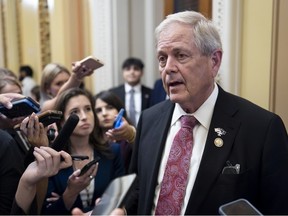Politics
Hardline Republicans Face Criticism While Highlighting Fiscal Concerns

Members of the House Freedom Caucus are facing criticism from various media outlets for their hardline stance on federal spending. Critics claim these Republicans have been engaging in political theatrics by threatening to withhold support for significant legislation known as the “One Big Beautiful Bill.” However, this perspective overlooks a crucial issue: the alarming fiscal state of the United States.
The Freedom Caucus, comprised of conservative Republicans, is raising awareness about the nation’s growing fiscal challenges. Their focus is not merely on political maneuvering, but rather on the substantial problems that have been building for years, resulting in a government spending crisis. Even if the Caucus were to secure additional spending cuts, the overall economic situation would still be dire, albeit slightly improved.
The problems at hand stem from a prolonged period of unchecked government spending. This has led to a substantial increase in federal debt, which is projected to reach levels equivalent to the entire Gross Domestic Product (GDP) of the nation by the end of 2024. As of 2024, federal spending is expected to consume nearly 23.1% of the GDP, a significant rise from 15.9% in 1965, when Medicaid was first enacted.
The Freedom Caucus, represented by figures like Rep. Ralph Norman of South Carolina, argues that it is crucial to address these fiscal issues. They emphasize that current federal spending patterns, including the growth of welfare programs such as Medicaid, do not align with the need for economic growth and opportunity for all Americans. The increase in Medicaid spending of 4.5% per year outpaces the overall economic growth, which has averaged only 2.2% annually since 2000.
One significant aspect of the “One Big Beautiful Bill” is its proposed reduction of Medicaid spending growth to 3% per year over the next decade. This restructuring aims to improve the efficiency of the program by introducing requirements for work among able-bodied individuals seeking enrollment. These changes have sparked debates about the balance between compassion for vulnerable populations and the necessity of fiscal responsibility.
The discussion surrounding federal spending is not simply about economics; it touches on the principle of opportunity for low-income Americans. A slowly growing economy may hinder wealth accumulation for the affluent, but it poses a greater risk to those who are just starting out. The challenge lies in creating conditions for a robust economy that can provide opportunities rather than perpetuating dependency.
As the United States approaches its 250th anniversary, it is vital to reflect on the country’s foundational principles. The growth of the welfare state and the accompanying increase in government spending and debt have transformed the economic landscape significantly over the past half-century. If left unchecked, these trends may further diminish opportunities for future generations.
The Democratic Party’s response to these challenges often involves advocating for increased welfare spending. However, the Freedom Caucus calls for a different approach, emphasizing personal responsibility and freedom as essential components of a thriving society. The choice facing American citizens is stark: continue down the path of increasing debt and dependence or prioritize the principles that foster individual opportunity.
In conclusion, while the Freedom Caucus may be criticized for their tactics, their unwavering focus on fiscal responsibility highlights the urgent need for a comprehensive discussion about the direction of the nation’s economic policy. As Star Parker, founder of the Center for Urban Renewal and Education, points out, it is essential to recognize the implications of federal spending patterns on the opportunities available to all Americans. By confronting these issues, the Freedom Caucus aims to steer the conversation towards a more sustainable and prosperous future.
-

 Politics4 weeks ago
Politics4 weeks agoSecwepemc First Nation Seeks Aboriginal Title Over Kamloops Area
-

 World5 months ago
World5 months agoScientists Unearth Ancient Antarctic Ice to Unlock Climate Secrets
-

 Entertainment5 months ago
Entertainment5 months agoTrump and McCormick to Announce $70 Billion Energy Investments
-

 Science5 months ago
Science5 months agoFour Astronauts Return to Earth After International Space Station Mission
-

 Lifestyle5 months ago
Lifestyle5 months agoTransLink Launches Food Truck Program to Boost Revenue in Vancouver
-

 Technology3 months ago
Technology3 months agoApple Notes Enhances Functionality with Markdown Support in macOS 26
-

 Lifestyle3 months ago
Lifestyle3 months agoManitoba’s Burger Champion Shines Again Amid Dining Innovations
-

 Top Stories2 months ago
Top Stories2 months agoUrgent Update: Fatal Crash on Highway 99 Claims Life of Pitt Meadows Man
-

 Politics4 months ago
Politics4 months agoUkrainian Tennis Star Elina Svitolina Faces Death Threats Online
-

 Sports5 months ago
Sports5 months agoSearch Underway for Missing Hunter Amid Hokkaido Bear Emergency
-

 Politics5 months ago
Politics5 months agoCarney Engages First Nations Leaders at Development Law Summit
-

 Technology5 months ago
Technology5 months agoFrosthaven Launches Early Access on July 31, 2025





















